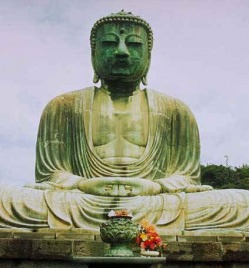Buddhism

500 million people in the world follow Buddhism
Buddhism was developed in India about 2,500 years ago by Siddhattha Gotama. Later in life he was known as Buddha
The foundation of Buddhism is the Nirvana (or enlightenment) attained by Siddhattha Gotama - which he believed saved him from the Hindu cycle of rebirth, and thereby suffering. The Buddha passed on his knowledge to monks
Buddhism teachings were originally spread by word-of-mouth. They were not written down until 300 years after the death of Buddha. One of the most importang Buddist texts is the Tipitaka, which means 3 baskets, because it was originally written on palm leaves and collected in baskets
- Most Buddists believe in the Buddha, the Dharma (teaching of the Buddha) and Sangha (a community of Buddhist monks)
- Buddha taught people that the way to become Enlightened was to follow 5 simple rules:
1. Avoid harming living things
2. Avoid taking things that have not been given to you freely
3. Live a decent lifesytle
4. Avoid speaking unkindly or lying
5. Avoid alchohol and drugs
- Meditation is necessary for Buddists to achieve Nirvana - and the basis for meditation is Samatha (a state of peacefullness when the mind is empty of all thoughts)
Rites of passage are less important in Buddhism than in other religions. There are some rights for birth and marriage, but generally Buddhists believe that attachments lock a person into the cycle of rebirth, so they are to be avoided
Buddhists worship at Temples and Shrines, where they pray to Buddha and meditate with other Buddhists. Temples can range from a simple room to an ornately decorated building.
In addition, Buddhists celebrate festivals throughout the year. Some of these festivals vary by country or particular towns
The spiritual leaders of Buddhists are monks and nuns
